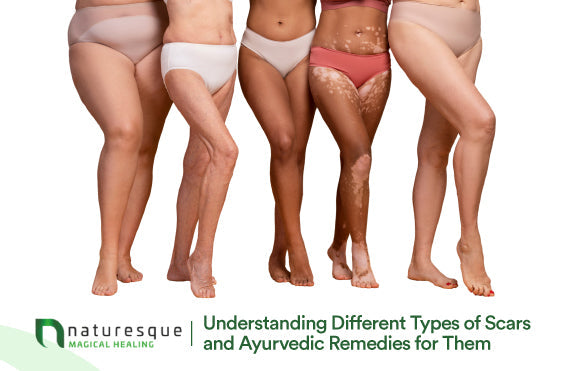© Naturesque. All Rights Reserved.
Understanding Different Types of Scars and Ayurvedic Remedies for Them
Content

Scars are more than just marks on the skin; they are reminders of injuries, surgeries, or infections that your body has healed over time.
Though some scars may naturally fade, others are persistent, impacting both looks and self-esteem.
Suppose there exists a mechanism to aid your skin in healing without any chemicals? Ayurveda, the traditional Indian medical system, presents a series of treatments for controlling and minimizing scars.
Let's analyze the types of scars and see how Ayurvedic treatments can treat them.
How Do Scars Form?
If the skin is injured from a cut, burn, surgery, or infection, the body initiates a healing process. New collagen fibers replace the injured skin and form scar tissue.
This tissue tends to be thicker and less pliable than regular skin, and that is why scars frequently look raised, colored, or uneven.
The texture, size, and color of a scar vary with the depth of the wound, the response of the body to healing, and even genetics. Certain scars tend to fade away by themselves, while others require treatment.
Types of Scars
1. Keloid Scars
Keloid scars develop when the body produces too much collagen during healing. These scars can grow beyond the original wound and may appear raised, firm, and sometimes itchy. They are more common in darker skin tones and can occur after minor cuts or surgical procedures.
Ayurveda suggests gentle oils and herbal balms to manage keloid scars. Ingredients like licorice root, aloe vera, and turmeric are known for their skin-healing and anti-inflammatory properties. Regular massage with these oils can soften scar tissue and reduce redness over time.
2. Burn Scar
Burn scars result from thermal, chemical, or electrical injuries. These scars often appear red, white, or dark and can be painful or tight. Severe burns can leave permanent marks.
Traditional Ayurvedic remedies for burn scars focus on soothing the skin and promoting natural healing. Herbal pastes made from neem, sandalwood, and turmeric can calm inflammation, while oil applications with coconut or sesame oil maintain skin moisture.
For deeper scars, Ayurvedic centers often recommend burn mark removal cream enriched with herbal extracts to gradually lighten the affected area.
3. Surgical Scars
Surgical scars are inevitable after operations, injections, or stitches. While modern treatments like laser therapy, dermabrasion, or grafts are available, they can sometimes cause side effects.
Ayurveda treats surgical scars with herbal oils and creams formulated to support collagen balance and skin regeneration. Ingredients such as ashwagandha, turmeric, and sandalwood help reduce inflammation and encourage smooth skin.
Gentle massage on the scar area is recommended once the wound has fully healed to improve circulation and minimize thickening.
4. Pregnancy Scar
Pregnancy can stretch the skin on the abdomen, breasts, and hips. After childbirth, the skin contracts, leaving stretch marks or scars, commonly known as pregnancy scars.
To manage pregnancy scars, Ayurveda emphasizes oiling and herbal pastes. Almond oil, sesame oil, and amla (Indian gooseberry) are popular for maintaining skin elasticity and reducing discoloration.
Regular application can prevent new scars from forming and fade existing ones naturally. A specially formulated cream for burns and scars can also be used safely post-pregnancy to aid recovery.
5. Chickenpox Scars
Chickenpox is a viral infection that can leave deep, pitted scars on the skin. These scars can be challenging to treat because they affect multiple layers of skin.
Ayurvedic treatments for chickenpox scars include herbal oils, pastes, and dietary support to improve skin regeneration. Ingredients like sandalwood, turmeric, and manjistha (rubia cordifolia) help lighten pigmentation and smooth the skin’s surface. Consistent application over months can gradually reduce visibility.
Ayurvedic Remedies That Work
Ayurveda approaches scar treatment holistically, combining external applications with internal support. Here are some commonly used remedies:
-
Herbal Oils and Pastes: Oils with neem, sesame, almond, or coconut help soften tissue, reduce inflammation, and nourish the skin.
-
Creams for Scar Management: Ayurvedic burn scar removal cream combines herbs to target pigmentation, texture, and redness.
-
Massage Therapy: Regular gentle massage on scar tissue improves blood circulation and flexibility of the skin.
-
Dietary Support: Eating antioxidant-rich foods like turmeric, amla, and fresh vegetables helps skin repair from the inside.
-
Sun Protection: Herbal sunscreens or natural pastes protect scars from darkening due to UV exposure.
FAQs About Scars and Ayurvedic Treatment
1. Can all scars be fully removed with Ayurveda?
Ayurveda helps reduce the appearance of most scars, but complete removal depends on the scar type, age, and depth.
2. Are Ayurvedic creams safe for sensitive skin?
Yes, most creams and oils use natural herbs and are gentle, but it’s best to do a patch test before regular use.
3. How long does it take to see results?
Visible improvement usually takes a few weeks to several months, depending on the scar and consistency of treatment.
4. Can Ayurvedic remedies prevent new scars?
Regular skin care with herbal oils and creams can improve healing and reduce the risk of noticeable scarring after injuries or surgeries.
Final Thoughts
Scars are a part of life, yet it does not have to control your self-assurance. Ayurveda offers a soft, natural method of coping with scars caused by burns, surgery, pregnancy, or chickenpox.
By using topical treatments together, nutritional support, and regular care, you can make your skin heal faster and healthier in the long run.
For those exploring natural scar remedies, incorporating Ayurvedic oils, pastes, and cream for burns and scars into your routine can make a significant difference.
Keep in mind, patience is the virtue, skin renewal requires time, but with the proper strategy, scars will disappear and skin will regain its radiance.



